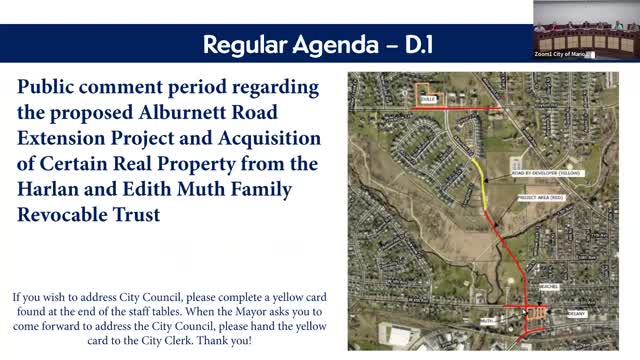Marion Council approves property valuations, authorizes acquisitions for Albonnette Road extension amid residents’ concerns about sidewalks and access
Get AI-powered insights, summaries, and transcripts
Subscribe
Summary
The City of Marion approved a series of resolutions establishing fair market value and authorizing acquisition — by negotiation or eminent domain — of multiple parcels needed for the Albonnette Road Extension Phase 1 project, while council members and affected homeowners pressed staff to seek alternative designs to reduce impacts such as smaller a
Marion City Council on Oct. 9 approved multiple resolutions setting fair-market value and authorizing acquisition of property along Eighth Avenue and other parcels for the Albonnette Road Extension Phase 1 project, while residents urged the city to seek design alternatives to avoid taking front-yard property and to address snow-removal and accessibility impacts.
The actions establish compensation and give staff authority to negotiate purchases or, if needed, to pursue eminent domain. Council voted to approve resolutions establishing fair market value and authorizing acquisition for parcels owned by the Harlan and Edith Muth Revocable Family Trust, Sean and Pamela Delaney, Bradley and Melissa Beechl, John and Carrie Dooley and others; staff said the property actions are needed to meet federal funding and project scheduling requirements.
Why it matters: the project is tied to roughly $7,000,000 in federal Congressionally-directed funds, and staff said failing to acquire the necessary rights before environmental clearances and bidding could endanger the funding and delay the project. Property owners described what they said would be substantial, ongoing burdens if the city acquires narrow strips of existing front yard for a five-foot sidewalk and roadway taper.
City staff and council gave a technical explanation of why the sidewalk and right-of-way are proposed. “When we get federal funds, we have to do what’s called a complete streets,” a city staff member explained during public comment, saying federal reviewers expect multimodal facilities and that the city could lose the $7,000,000 if it omitted the proposed gap in sidewalk coverage. Staff also said the project includes a new traffic signal and that parts of the work will be built by a private developer as part of their development.
Several adjacent homeowners said the proposed alignment would shorten small front yards, increase maintenance obligations and create safety and access issues. “I’m just not a fan of that. If you were to put in a sidewalk there, it would cause quite a bit more work on my side as far as whether or not I have to plow that and keep that clear,” Sean Delaney said, listing snow clearing and foot-traffic concerns and saying he counted “fewer than seven people” using the existing sidewalk across the street on a busy day.
Residents who live on lots with rear access also told the council the change would complicate their ability to reach and clear sidewalks and driveways. “I have probably four hours worth of snow removal on a given normal snow … I’m going to break the noise ordinance guaranteed,” said Bradley Beechl, describing the time and logistics involved in winter maintenance.
Council members said they sympathize with affected owners and asked staff to continue negotiations and look for design or mitigation measures. Councilman Harper suggested additional on-site inspections and possible creative solutions to reduce impacts; staff said authorization tonight would let them continue negotiations and start procedural steps required by funding deadlines but that staff could still pursue alternatives in parallel. City attorney and staff reiterated that even after fair-market-value resolutions are passed, the city will continue attempts to negotiate and will bring any purchase agreements back to council for approval.
The council approved: Resolution No. 32,582 (fair market value for the Muth property) and Resolution No. 32,583 (authorizing acquisition by negotiation or eminent domain for the Muth parcel); Resolution No. 32,584 and 32,585 (Delaney); Resolution No. 32,586 and 32,587 (Beechl); and Resolution No. 32,588 (Dooley), each establishing compensation or authorizing acquisition as needed for the Albonnette Road Extension Phase 1. During discussion council agreed to schedule walk‑downs with property owners and to continue negotiating up until any condemnation hearing.
Staff said the project remains subject to environmental clearances and statutory deadlines tied to the federal funding; if the city cannot demonstrate rights to necessary parcels before letting the work, staff warned the federal or state reviewers could withhold funds or delay contracting. Council members asked staff to return with any feasible alternatives that could avoid or reduce property takings and to coordinate follow‑up meetings with owners.
The council’s approval authorizes negotiation and, if necessary, the condemnation process, but staff emphasized property owners will receive a last notice and that negotiations may continue up to the date of any hearing. The council left open the option to defer a particular parcel for additional study if a workable alternative emerges, but votes taken on Oct. 9 authorized staff to continue acquiring the parcels needed for the Phase 1 work and to protect the funding timeline.
Looking ahead: staff said they will continue outreach to affected owners, perform site walk‑downs, and return to council with purchase agreements, further engineering details and any proposed design modifications.
